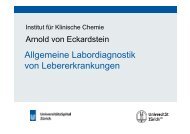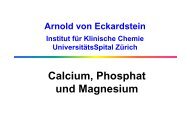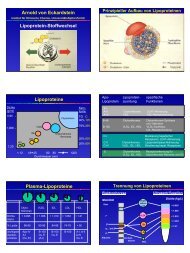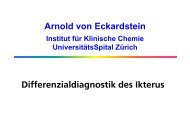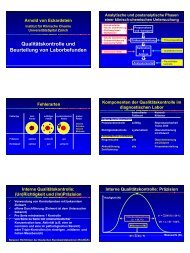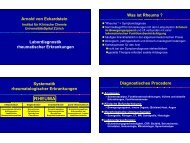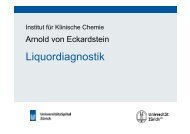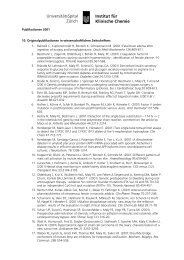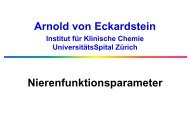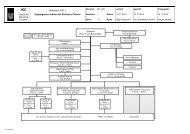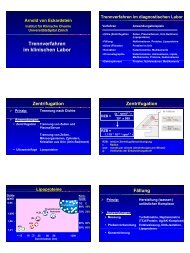2006 - Institut für Klinische Chemie - UniversitätsSpital Zürich
2006 - Institut für Klinische Chemie - UniversitätsSpital Zürich
2006 - Institut für Klinische Chemie - UniversitätsSpital Zürich
Sie wollen auch ein ePaper? Erhöhen Sie die Reichweite Ihrer Titel.
YUMPU macht aus Druck-PDFs automatisch weboptimierte ePaper, die Google liebt.
Universität <strong>Zürich</strong> > Medizinische Fakultät > <strong>Klinische</strong> <strong>Chemie</strong>, <strong>Institut</strong> <strong>für</strong> > Prof. Dr.<br />
Arnold von Eckardstein<br />
Do lipoproteins modulate pancreatic beta-cell survival and function?<br />
Summary / Zusammenfassung<br />
Numerous clinical and epidemiological studies have demonstrated the associations of<br />
hypertriglyceridemia (i.e. increased aounts of very low density lipoproteins = VLDL), low high<br />
density lipoprotein (HDL) cholesterol and the presence of small dense low density lipoproteins<br />
(LDL) with increased risk of future type 2 diabetes mellitus. Traditionally these dyslipidemias<br />
have been considered as indirect confounders of insulin resistance, i.e. the immediate precursor of<br />
diabetes mellitus type 2. More recent data, however, showed that lipoproteins exert biological<br />
functions beyond lipid transport, for example regulation of cell proliferation and cell death. Initial<br />
results indicate that VLDL and LDL exert pro-apoptotic effects on beta cells which are<br />
counteracted by HDL. In this line we, i.e. two laboratories with long standing histories in either<br />
lipoprotein and atherosclerosis research (A.v.E.) or diabetes research (M.D.), wish to collaborate<br />
and to answer the following two questions: 1. What are the effects of VLDL, different LDL size<br />
classes and HDL on beta cell survival, proliferation and function and do these lipoproteins<br />
modulate the adverse effects of cytokines, leptin, saturated fatty acids and high glucose? 2. Which<br />
molecular components are responsible for the putative beneficial effects of HDL on beta-cell<br />
turnover and secretory function? To answer these questions a PhD student will perform a series of<br />
experiments in primary human and murine beta cells, to monitor the effects of native lipoproteins<br />
and isolated protein and lipid components thereof on apoptosis, cell proliferation, insulin<br />
production and secretion, and protein kinase B (Akt) activity. The elucidation of lipoprotein effects<br />
on beta cell function and survival may open new avenues to the introduction of treatment<br />
modalities aimed to prevent or delay the manifestation of diabetes mellitus.<br />
Publications / Publikationen<br />
Rohrer, L, Hersberger, M, von Eckardstein A (2004). High density lipoproteins in the intersection<br />
of diabetes mellitus, inflammation and cardiovascular d˛sease. Curr. Opin. Lipidol. 15, 269-278<br />
Donath MY, Halban PA (2004). Decreased beta cell mass in type 2 diabetes: significance,<br />
mechanisms and therapeutic implications. DIabetologia 47: 581-589<br />
Keywords / Suchbegriffe<br />
HDL, diabetes, beta cells<br />
Project Leadership and Contacts / Projektleitung und Kontakte<br />
Prof. Marc Donath (Project Leader) marc.donath@usz.ch<br />
Prof. Arnold von Eckardstein (Project Leader) arnold.voneckardstein@usz.ch<br />
Dr. Lucia Rohrer lucia.rohrer@usz.ch<br />
Funding Source(s) / Unterstützt durch<br />
Nachwuchsförderungskredit der Universität <strong>Zürich</strong>, Foundation<br />
Novartis Foundation and Center of Integrated Human Physiology<br />
Project 6030<br />
Seite 1<br />
All



